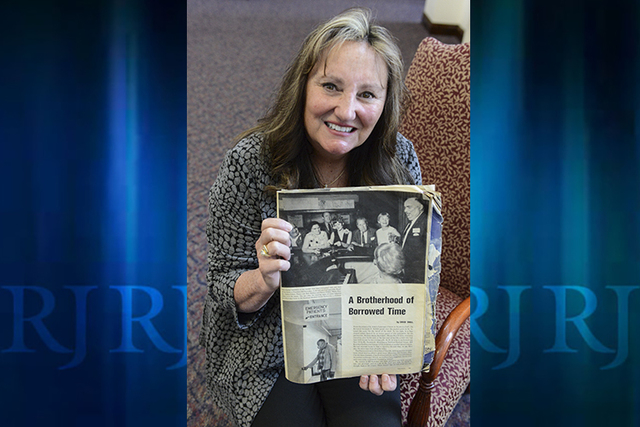Nevada woman offers heart-felt support for transplant bill

CARSON CITY — Mendy Elliott recalled watching the Apollo moon landing in a hospital room with her father after he became one of the world’s earliest heart transplant recipients.
Though he died soon afterward in August 1969, the pioneering legacy of him and others described at the time by an article in Life magazine as a “Brotherhood of Borrowed Time” lives on.
Elliott’s father, William Karraker, was a strapping World War II veteran who flew the Memphis Belle home from Europe after the war. Living in Stockton, Calif., in the mid-’60s, he was diagnosed with an abnormal heart muscle.
He was approached about becoming a heart transplant recipient, a relatively new, cutting-edge procedure.
“We all voted as a family whether he should have a transplant,” said Elliott, a Reno resident who is past director of the Nevada Department of Business and Industry and deputy chief of staff to former Gov. Jim Gibbons.
If her mother or any of the four children voted no, it was off. Instead, it was a unanimous go-for-it.
“I was 13,” Elliott said, her eyes brimming with tears decades later. Karraker, a insurance executive, underwent the transplant in November 1968 at Stanford Medical Center in California. His was the eighth transplant to be conducted at Stanford and the 87th in the world.
He died 11 months later at the age of 50. But for Elliott, those extra months were a precious gift.
She held a worn and tattered copy of that Life magazine article recapping her father’s story as she testified last week in favor of Senate Bill 206, a measure supporters hope will nurture more organ donors.
Under existing law, people are asked, yes or no, if they want to be an organ donor when they get or renew a driver’s license or identification card.
Also, unless donors reaffirm their wishes when renewing a license, they are automatically removed from the donation registry by default.
SB206 sponsored by Sen. Ben Kieckhefer, R-Reno, would change the “no” designation to “not at this time,” a move organ donation advocates say could make a huge difference for families faced with a decision after a tragic death.
It would also automatically keep people who say “yes” on the registry unless they specifically ask to be removed.
“It just seems so human to make a gift of yourself to someone else at their greatest moment of need and your purest opportunity to give,” Kieckhefer said.
Answering “no” on the driver’s license question doesn’t prohibit family members from donating a loved one’s organs. But it could add to the emotional stress of making that decision because it would seemingly be against the wishes of the deceased.
“Some applicants may select ‘no’ simply because they have not learned enough about the lifesaving benefits of donation and are not ready to make the heroic decision to donate at that exact moment,” Joe Ferreira, chief executive of the Nevada Donor Network, said in written testimony.
“A few years later, that person may change their mind and decide they would like to help someone in need. However, if they did not change their designation to a ‘yes,’ this leaves their family with a difficult decision since they had at one point said no.”
Nationwide, there are 123,000 people on a waiting list of an organ transplant, according to statistics provided by Nevada Donor Network.
In Nevada, there were 576 as of mid-January, with 436 awaiting a kidney transplant. Eighteen were awaiting new hearts and 106 a liver. Only kidney transplants are done in Nevada at University Medical Center in Las Vegas.
With roughly 868,000 registered donors statewide, Nevada ranks 40th in the nation in terms of registration as a percentage of population, said Kate McCullough, spokeswoman for the donor network.
One organ donor can save up to eight lives and improve the lives of more than 50 people through donation of tissue such as bone, skin, heart valves and corneas.
SB206 is pending in the Assembly Transportation Committee because it involves altering driver’s license forms.
Contact Sandra Chereb at schereb@reviewjournal.com or 775-687-3901. Find her on Twitter: @SandraChereb.